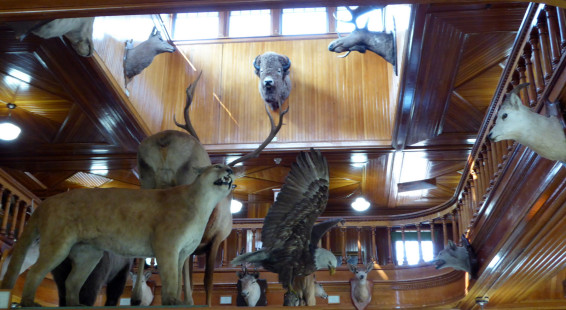
Today we’re going to visit Western Canada’s oldest Natural History Museum, the quirky yet fascinating Banff Park Museum National Historic Site. I first visited this museum as a boy decades ago and it’s one of the few things around that hasn’t changed over the years.
Situated at a prime location in Banff, beside the Bow River at the corner of Buffalo St and Banff Ave, there’s a large building constructed of logs, the Banff Park Museum. It’s been declared a national historic site because the museum’s original exhibits are still on display, a collection reflecting an early (some might even say “primitive”) approach to the interpretation of Western Canada’s natural history. Also, the architectural style and detailing of the 1903 log building are characteristic of early federal buildings in Banff National Park, considered by some as the “old rustic Banff style”. I found the interior woodwork (made of locally available woods) to be beautiful and a work of art, but I’m a sucker for nicely worked wood.
Banff tourism boomed in the late 19th century, when the completion of the railway to Banff gave folks wanting a mountain experience easy access to the Canadian Rockies. The town of Banff sprang up and the museum was constructed as a site that would be of interest to tourists. It was a way to see all the animals in the Canadian Rockies without leaving the town of Banff. Immediately adjoining it in the old days was the Banff Zoo — yes, you heard that correctly — there was a zoo in this National Park, where people could see grizzly bears and such up close. The zoo is long gone and has been replaced by a nice public park, but the Banff Park Museum sits there to remind us of times gone by. It’s even said to be haunted by a ghost!
The Banff Park Museum has 5,000 vintage specimens – many of them stuffed animals and birds, but also a collections of rocks and plants. It’s a fascinating step back in time, to see how natural history was interpreted and presented a century ago, and does offer people a way to see the diversity of wildlife (admittedly just taxidermy specimens) in the west under one roof. The museum and its collection is largely the product of it’s first curator (1896-1932), the enthusiastic Norman Bethune Sanson.
Admission is only a few dollars and if you like Natural History or historic buildings, it’s worth an hour or two of your time to explore this one. The building has a wonderful library/reading room, and beside it an interactive Discover room where kids can view videos and touch specimens, like antlers and fur.
A few more image of the museum follow:
